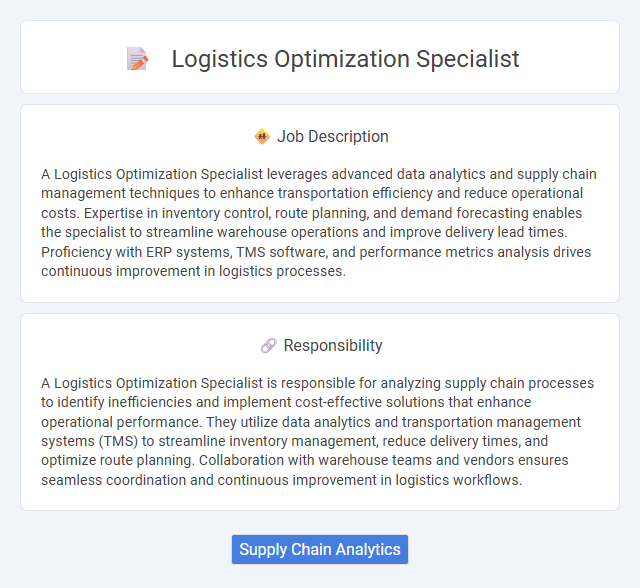
A Logistics Optimization Specialist leverages advanced data analytics and supply chain management techniques to enhance transportation efficiency and reduce operational costs. Expertise in inventory control, route planning, and demand forecasting enables the specialist to streamline warehouse operations and improve delivery lead times. Proficiency with ERP systems, TMS software, and performance metrics analysis drives continuous improvement in logistics processes.
Individuals with strong analytical skills and a passion for problem-solving will likely find a logistics optimization specialist role suitable, as it demands constant evaluation and improvement of supply chain processes. Those comfortable with data analysis and working under pressure may thrive in this fast-paced environment. However, people preferring routine tasks or minimal collaboration might find the dynamic and strategic nature of this job challenging.
Qualification
A Logistics Optimization Specialist requires a strong background in supply chain management, data analysis, and process improvement methodologies such as Lean or Six Sigma. Proficiency in advanced software tools like SAP, Oracle, or Python for data modeling and forecasting is essential. Effective communication skills and experience in cross-functional collaboration ensure the successful implementation of cost-saving and efficiency-enhancing logistics strategies.
Responsibility
A Logistics Optimization Specialist is responsible for analyzing supply chain processes to identify inefficiencies and implement cost-effective solutions that enhance operational performance. They utilize data analytics and transportation management systems (TMS) to streamline inventory management, reduce delivery times, and optimize route planning. Collaboration with warehouse teams and vendors ensures seamless coordination and continuous improvement in logistics workflows.
Benefit
Logistics optimization specialists likely improve supply chain efficiency by analyzing data and streamlining processes, which may reduce operational costs and increase delivery speed. They probably enhance inventory management, leading to fewer stockouts and improved customer satisfaction. This role often contributes to better resource allocation, potentially boosting overall business profitability and competitiveness.
Challenge
Logistics optimization specialists likely face the challenge of managing complex supply chains with fluctuating demand and limited resources. They are expected to develop efficient strategies that minimize costs while maintaining timely deliveries, which often involves navigating unpredictable variables such as traffic delays and supplier inconsistencies. Success in this role probably depends on strong analytical skills and adaptability to rapidly changing conditions.
Career Advancement
Logistics optimization specialists leverage advanced data analytics and supply chain management techniques to improve operational efficiency and reduce costs. Mastery of tools like ERP systems, predictive modeling, and automation technologies positions professionals for leadership roles in supply chain strategy and project management. Career advancement opportunities often include senior analyst positions, logistics operations manager roles, and executive-level appointments in global logistics and distribution companies.
Key Terms
Supply Chain Analytics
Logistics optimization specialists leverage supply chain analytics to enhance operational efficiency and reduce costs across transportation, warehousing, and inventory management. They utilize data-driven insights from predictive modeling, route optimization algorithms, and demand forecasting to streamline distribution networks and improve delivery performance. Mastery of tools like SQL, Excel, and advanced analytics platforms enables them to identify bottlenecks and implement strategic improvements in supply chain processes.
 kuljobs.com
kuljobs.com